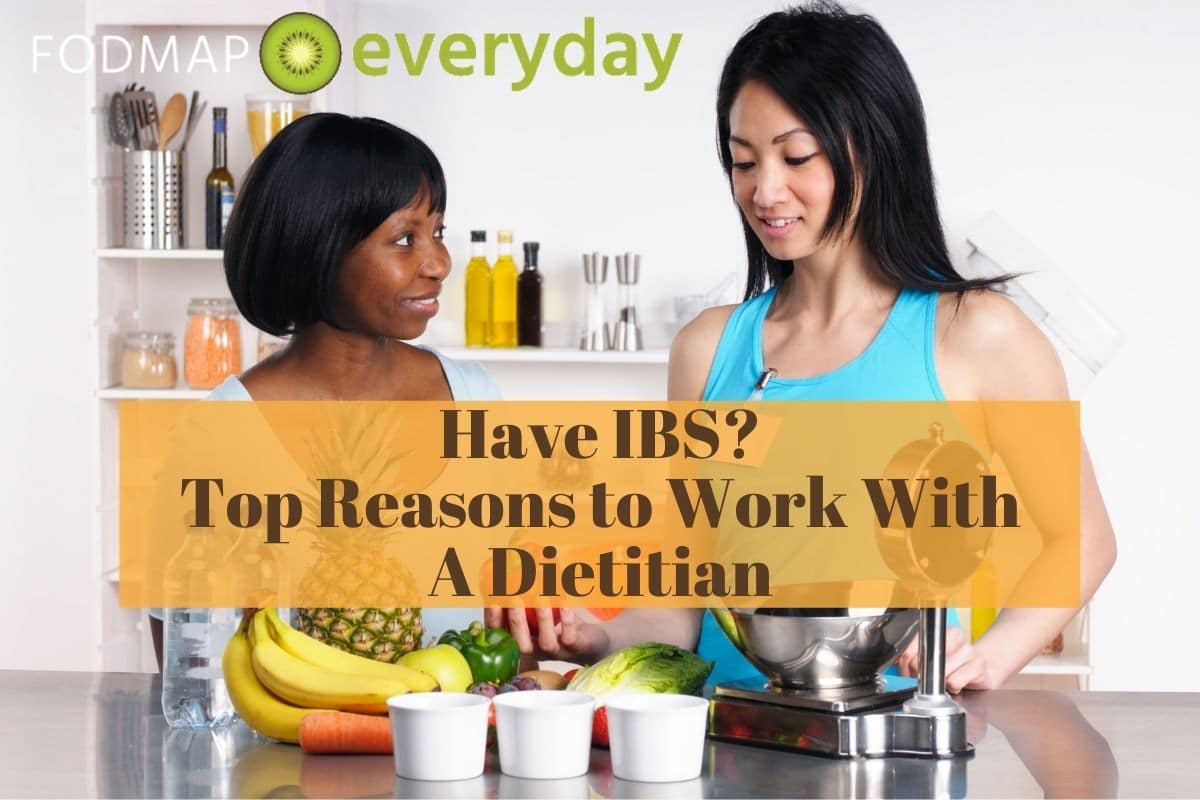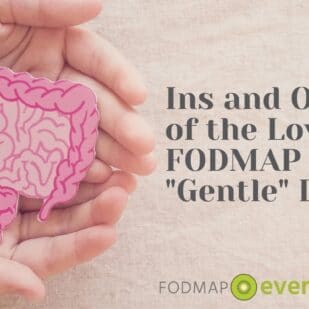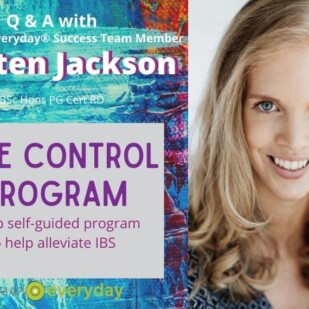You have probably heard from us and others that working with a Registered Dietitian (RD, RDN, or the equivalent in your country) is recommended when undertaking the low FODMAP diet. We know that this might be out-of-pocket for many, and that it might seem unattainable financially and/or superfluous in general.

There are many good reasons for why we recommend working with a Registered Dietitian and that is what this article addresses – including how it can ultimately be more economical than other approaches.
RDs, RDNs – And Others
First, we suggest you pause at this point and read our article, Dietitians vs. Nutritionists: What’s The Difference?
Terminologies vary country to country, but for instance in the United States, most anyone can call themselves a “nutritionist”, while the designation of “Registered Dietitian” is tightly regulated and RDs will be highly educated and appropriately credentialed.

Be sure to read: How To Choose A Dietitian
Health coaches, nutritionists, naturopaths, wellness coaches and culinary nutritionists, to name a few, are not the same as a Registered Dietitian (RD) or Registered Dietitian Nutritionist (RDN).
Health coaches, nutritionists, naturopaths, wellness coaches and culinary nutritionists, to name a few, are not the same as a Registered Dietitian (RD) or Registered Dietitian Nutritionist (RDN).
You can use our Global Dietitian Directory to find a dietitian to work with. Those who are Monash University trained are designated as such and we strongly suggest them. Remember that you do not have to stick close to home: ask about telehealth options, even international.
You might want to check out our article, Patient Dos and Don’ts For a Great Telehealth Appointment.
Top Reasons To Work With A Dietitian
Take a look at this list of the top reasons we suggest working with a RD:
- The low FODMAP diet is nuanced and complex
- Every single one of us brings a unique medical picture to the table
- Monash University researchers, the developers of the diet, suggest that you undertake the diet along with a Registered Dietitian
- Our team of Registered Dietitians also suggest working with a RD
- Statistically you will have a greater chance of success undertaking the low FODMAP diet if you work with a Registered Dietitian
- Anecdotally you will have a greater chance of success undertaking the low FODMAP diet if you work with a Registered Dietitian
- A RD will help you find answers and relief in the fastest way possible; working alone often means spinning your wheels again and again and not finding relief.
- Crowdsourcing any kind of medical help via the Internet is not recommended
- This is why we at FODMAP Everyday® do not give individual medical advice:
- We are not your personal medical team
- We have never met you
- We do not know your entire medical history and needs
- Legally, it would be unwise for us to diagnose and treat
Let’s Talk About The Cost
The number one reason folks say they are not using a RD is cost.
If you have insurance, please research your plan. You might have coverage. If not, then read on.
We understand that everybody has a household budget and is in charge of how far their money can go. We could find an average cost – the Academy of Nutrition and Dietetics doesn’t keep such statistics – but we have anecdotally heard of costs ranging from $45 for a half-hour meeting, to a few hundred dollars or an hour-long meeting.
We want to point out some money saving aspects of working with a Registered Dietitian.
It Can Be Short Term Help
First of all, consulting a dietitian does not have to be a very long-term situation. Time and time again we have seen people truly suffering with their IBS who gain an immense amount of control of their diet and symptom relief after just 2 to 4 visits with a Registered Dietitian.
Money & Time Well Spent
We know money spent on a Registered Dietitian will not be an insignificant amount. We do want you to consider the following:
- How many years have you been suffering? It is common for those with IBS to suffer for decades before finding relief.
- Statistically it takes more than 6 doctor visits to receive an accurate diagnosis. We HIGHLY suggest you consult a gastroenterologist for your diagnosis. But they are not actually trained to help you with your day-to-day approach to the diet. Registered Dietitians ARE!
- How much have you already spent on co-pays to various doctors?
- How many diets and regimes have you tried? If is not unusual for our RDs to hear about all the self-diagnoses and attempts at healing: keto, intermittent fasting, paleo, raw, Whole30, not eating white foods, vegan, vegetarian, fill-in-the-blank. If FODMAPs are your issue, none of these will be the whole answer.
- How much money have you spent on the foods for those diets?
- Have you purchased all sorts of supplements and have half-used bottles in your cabinet? Or did you use them, but still have IBS symptoms? This can often total in the hundreds of dollars.
- How many nights have you suffered poor sleep that affected your work and life in general? Can you put a price on that? Yes, we can! Statistics tell us that over $21 billion is lost yearly in missed workdays in the U.S. alone. That is money for your employer, but what about your missed paychecks? What about missing your BFFs birthday party, or your own Christmas party?
- And at the expense of being a bit cheeky, the average cost of a hot drink at Starbucks is about $4 (conservatively). Go every day? That’s about $120 a month right there…

Let’s Talk About Access
The number 2 reason folks say they are not using a RD is that they can’t find one.
Again, please take a look at our Global Dietitians Directory and remember to ask about telehealth appointments. You might not even have to leave your own home to work with a dietitian – who will help you become pain free and end up with a great relationship with food.
Registered Dietitians To The Rescue
The low FODMAP diet is meant to be undertaken along with a Registered Dietitian (RD, or equivalent in your country). The diet is nuanced and complex; statistically and anecdotally you will have a greater chance of success if you work with one.
We have put together a series of articles called Working With A Dietitian to help you learn why you should work with a dietitian, how to find the right dietitian for you, the difference between dietitians and nutritionists, what to expect from working with one, tips for successful telehealth appointments, and more.
Please take the time to familiarize yourself with these articles and resources:
- How To Choose A Dietitian
- IBS: Step-by-Step Guide From Diagnosis To Symptom Free Living
- Dietitians & Nutritionists: What’s The Difference?
- Patient Dos And Don’ts For A Great Telehealth Appointment
- What If The Low FODMAP Diet Isn’t Working?
- Global Dietitian Directory
The Takeaway
The low fodmap diet is nuanced and complex and can be difficult for the layperson to understand. Statistically, and anecdotally, you will have a greater chance of success if you work with a Registered Dietitian. And we define success as experiencing IBS symptoms relief!
Many RDs do take insurance; check your plans. That said, working with a Registered Dietitian might very well be an out-of-pocket cost for many you, but we believe it is money well spent and in the end is actually a more economical way, and more direct way, for you to find relief and learn about your dietary triggers.
In addition, with the advent of more and more RDs utilizing telehealth, it is easier than ever to find a RD to work with.
Working with a RD = saving money, saving time, and experiencing relief and identifying triggers in the quickest, most direct way possible.
Working with a RD = saving money, saving time, and experiencing relief and identifying triggers in the quickest, most direct way possible.







